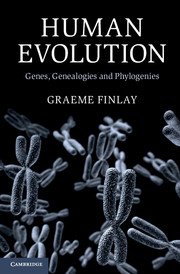3 - Pseudogenealogy
Published online by Cambridge University Press: 05 June 2014
Summary
Geneticists have studied mutations intensively over the years. They recognise various categories and can anticipate their likely effects. Some mutations involve major reorganisations of the genome. Segments of DNA may be deleted, duplicated, inverted or exchanged between chromosomes. If these involve sufficiently large portions of chromosomes, they will be visible microscopically in mitotic chromosomes. At the other extreme of the size spectrum, mutations may change only one or a few bases. One base may be substituted for another. One or a few bases may drop out of the sequence (be deleted) or drop in (be inserted).
The genetic code is the information system according to which the sequence of bases in DNA specifies the sequence of amino acids in proteins. The code was spectacularly deciphered in the 1960s. A run of three bases in DNA (a base triplet, or codon) specifies the identity of an amino acid in a protein. Three particular codons have the function of specifying the end of the protein-coding section of a gene sequence. These are called the stop codons, and are TAG, TGA and TAA. Any base change mutation that transforms a codon specifying an amino acid into a codon specifying the stop command will terminate the protein. The resulting protein will lack all content between the stop mutation and the authentic stop codon. Such premature termination is typically disastrous for protein function.
- Type
- Chapter
- Information
- Human EvolutionGenes, Genealogies and Phylogenies, pp. 132 - 193Publisher: Cambridge University PressPrint publication year: 2013



